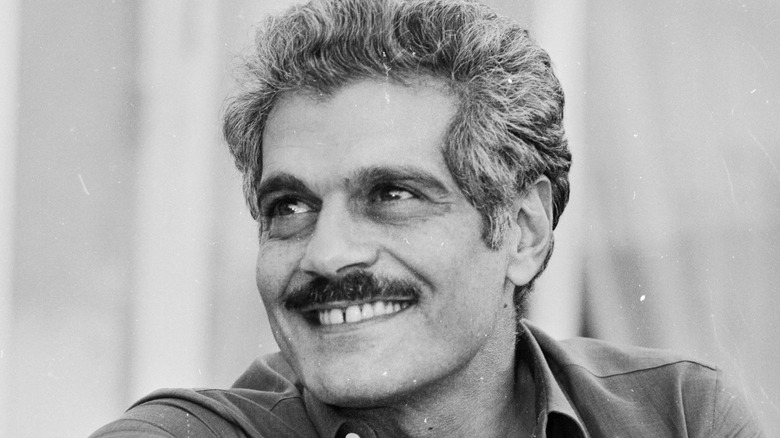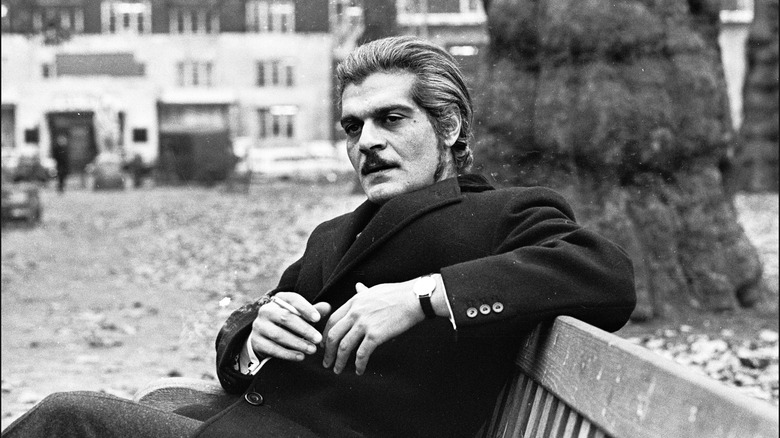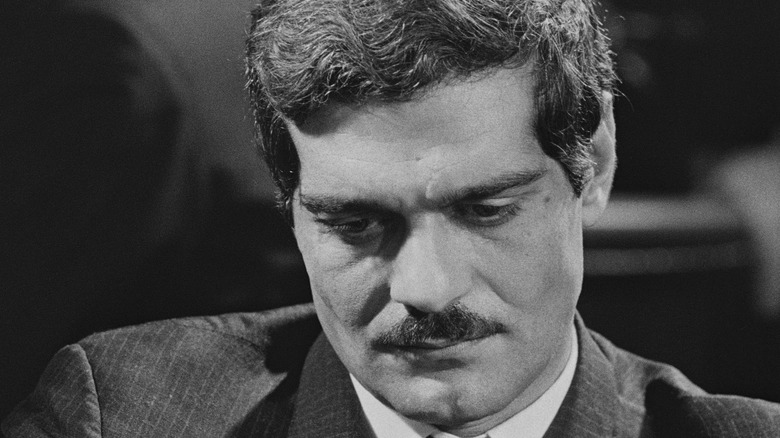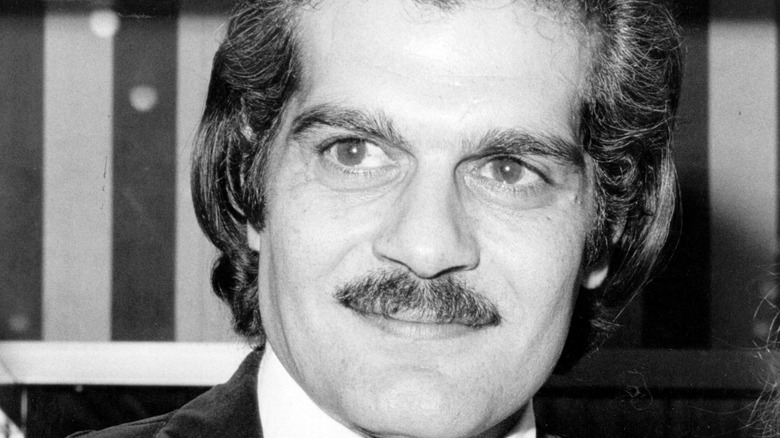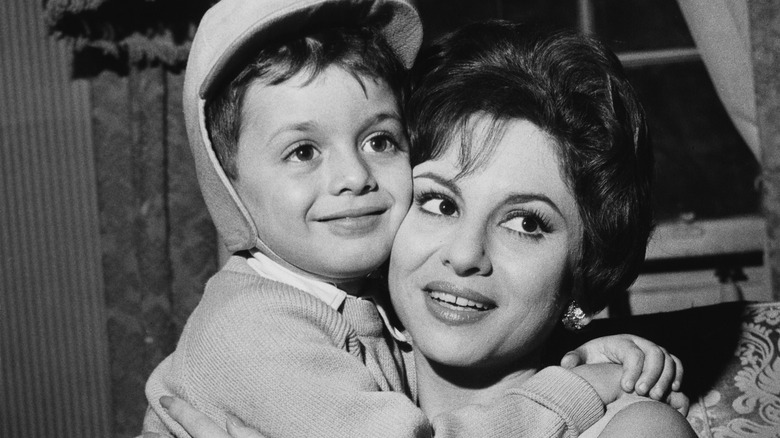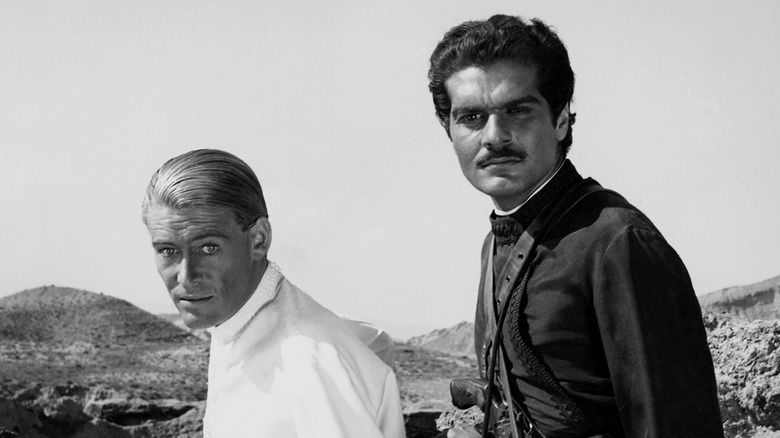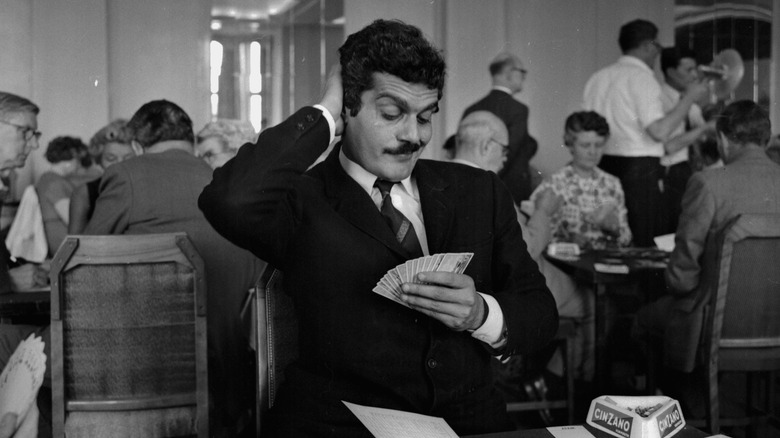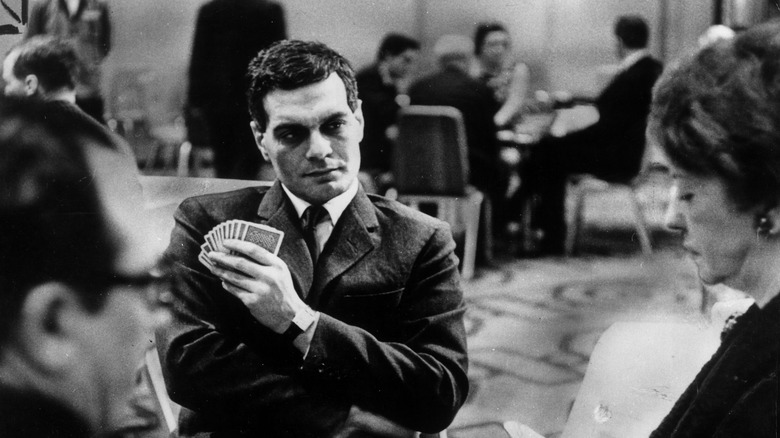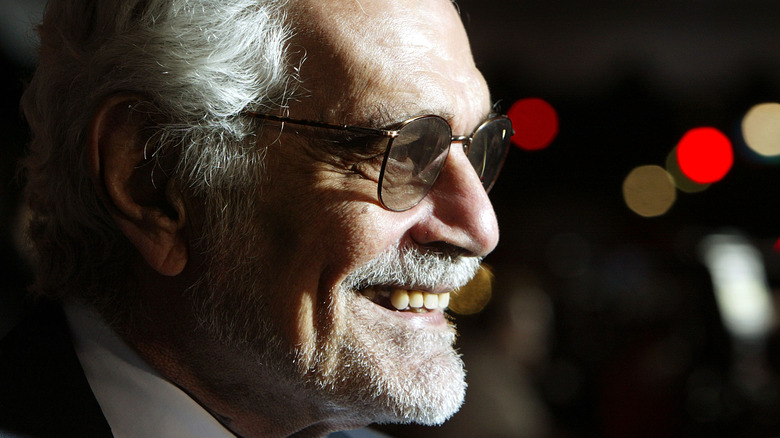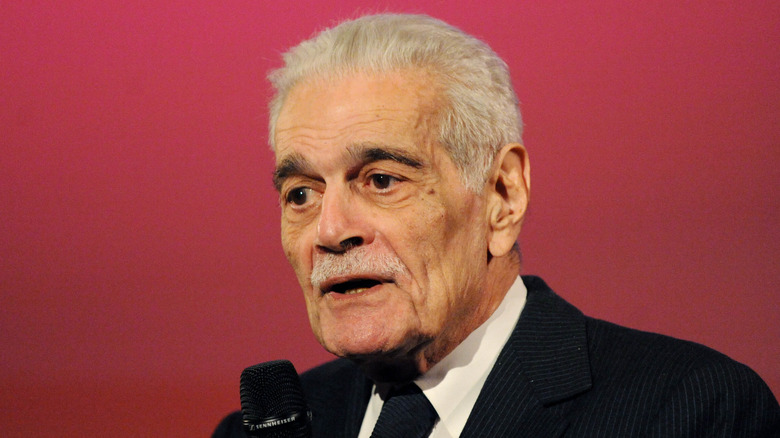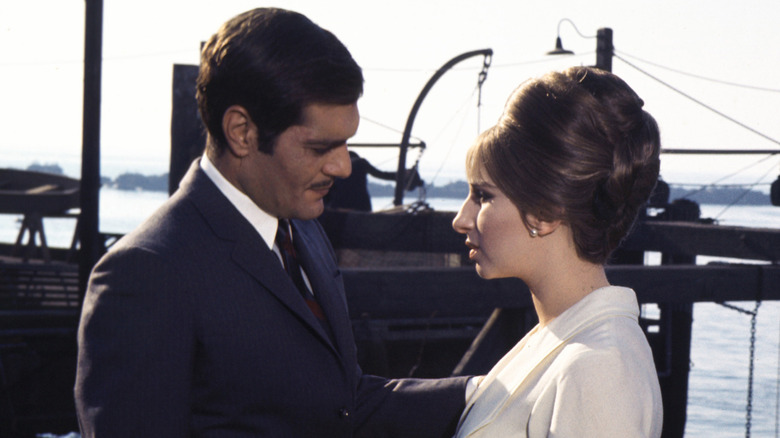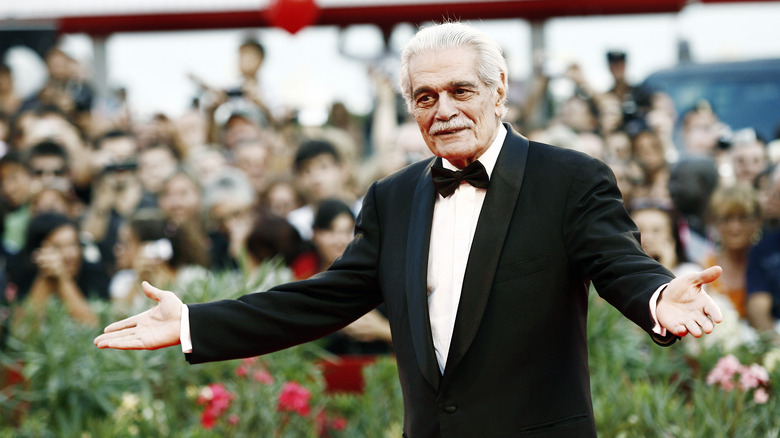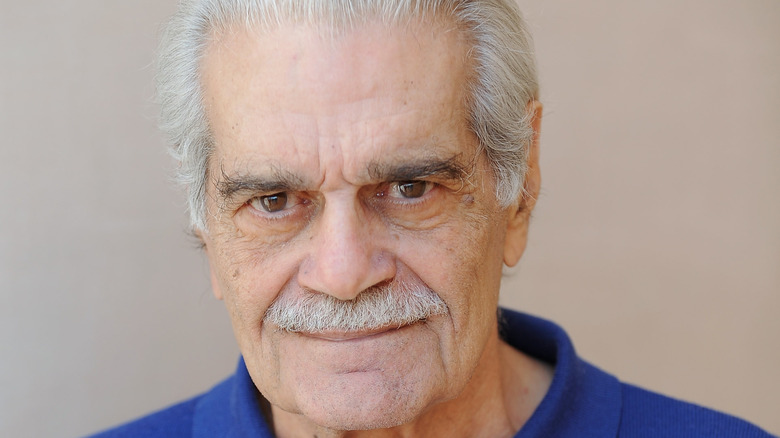The Untold Truth Of Omar Sharif
Egyptian actor Omar Sharif was born in Alexandria, Egypt, in April 1932. According to the BBC, he was always meant to be an actor. He was a part of his father's lumber company but couldn't stay put because he knew that it wasn't his calling. Sharif didn't lose heart: He threw caution to the winds and decided to explore the world of cinema instead. His first film, "Siraa Fil-Wadi" ("The Blazing Sun") was released in 1954. Sharif became known for his extraordinary acting skills over the years and even landed a role in the iconic 1965 film, "Doctor Zhivago."
Shooting the movie wasn't an easy task for Sharif, who had to regularly straighten his hair and undergo skin-waxing "to disguise his Egyptian looks." It took such a toll on him that he nearly had a nervous breakdown. Later in his life, Sharif said in an interview with The New York Times that it wasn't easy being an actor and living like a nomad. "The difficulty about my kind of life is I meet mostly actors and socialites instead of normal people," he explained. "The choice is more limited."
This is the untold truth of Omar Sharif.
If you or someone you know is struggling with mental health, please contact the Crisis Text Line by texting HOME to 741741, call the National Alliance on Mental Illness helpline at 1-800-950-NAMI (6264), or visit the National Institute of Mental Health website.
He was born in a privileged home
Omar Sharif was born as Michel Demitri Shalhoub in a privileged home in Alexandria and studied physics and mathematics while pursuing his undergraduate degree at Cairo University. While Sharif's dad was focused on his lumber business, his mom was a well-known society hostess who was on good terms with the king and often played cards with him (via Egypt Today).
Sharif was lucky enough to study at an English boarding school where he got the opportunity to join the theatre program and hone his acting skills. His dad wasn't too pleased at the time but didn't stop his son from following his dreams. Also, his parents didn't hesitate to give Sharif anything he wanted in his youth. He told The New York Times, "My father was a wonderful guy. He would give me a weekly allowance, which I would finish in one day. Then I would say to my mother, 'I have to take a girl out to dinner.' And she would say, 'Sure, what do you need, baby?'"
He had a knack for languages
According to Omar Sharif's autobiography, "The Eternal Male," the actor loved learning new languages and knew English, French, Greek, Spanish, Arabic, and Italian. Film producer Sam Spiegel was taken aback when he heard Sharif speak English fluently for the first time. "For an American, an Arab who spoke English fluently was a bit of an anachronism; that must have a few trumps in my hand," Sharif wrote.
Per Sharif, his accent was fairly minor and hard to identify, something that worked in his favor and allowed him to play "the role of a foreigner" without anyone being able to pinpoint where he was from. The actor acknowledged that this was an advantage, a skill that was beneficial throughout his acting career.
As highlighted by Egypt Today, Sharif's mom spoke French, something that helped him pick up the language. Of course, it helped that he was a bright kid who was able to pick up several languages with ease. Also, Sharif remembered his uncle in "The Eternal Male" and said that he was devoted to French literature and introduced his nephew to French writers. The actor admitted, "I understood the French language so well that I read the English writers — even Shakespeare — in French. I laugh to think of it today."
His father was initially unsure of his acting career
Omar Sharif was interested in pursuing a career as an actor and even studied at The Royal Academy of Dramatic Art in London, according to a piece by The Evening Standard. He was intrigued by acting when he was just 18 years old and ended up starting an acting group a couple of years later. He wrote in the book, "The Eternal Male" that his father supported him in different ways and didn't hesitate to spend money on his son in general. Here's an example: when he turned 16, Sharif was gifted a brand new car.
However, Sharif's father was not enthusiastic about his son pursing a career as an actor. Sharif wrote, "He refused to encourage my aspirations for the theater. To him, it was a passing fancy, a whim that would keep me out of his lucrative timber business." However, a "lack of funds" meant that Sharif had to tackle things like production and recruiting team members all by himself.
He changed his religion for love
Omar Sharif was a passionate man who fell for a popular Egyptian actress, Faten Hamama, in the 1950s. Per The Los Angeles Times, the two first came across each other while shooting the film "The Blazing Sky" and fell in love. Hamama ended her marriage with an Egyptian director to be with Sharif who made the decision to switch to Islam from Christianity to marry the actress.
Sharif wrote in "The Eternal Male" that his decision to change his religion was tough for his family members, and it took some time for the news to sink in. However, on the day of the wedding, his father told everyone, "From now on, I want everybody to be happy," adding his son was getting married which was, of course, a big deal for the whole family.
Surprisingly, Hamama's husband didn't object to the fact that his wife was leaving him for an another man. Sharif said, "Faten's husband was a real gentleman" and wrote that he even agreed to a formality to ensure that the separation took place amicably.
He almost didn't get his big part in Lawrence of Arabia
Omar Sharif was not the first choice when "Lawrence of Arabia" director David Lean was scouting for an actor to play the iconic character, Sherif Ali, in the film. According to a Times of India piece, it was Bollywood actor Dilip Kumar who was first asked to take on the role in the 1962 film. Lean even met the actor and tried to convince him to be a part of the film, but Kumar wasn't keen on playing Ali, and the director started looking for other options.
According to Sharif, David Lean "wanted Ali to be true to life" and searched for a long time; the part was assigned to another actor, but Lean's team realized that it wouldn't work out (via "The Eternal Male"). One of his assistants ended up reaching out to Omar Sharif, who landed the role that would define the rest of his career as an actor.
Per Business Insider, this was Omar Sharif's first English film; he didn't know it yet, but it would be make him a popular actor. His character, Sherif Ali, has a memorable entrance in "Lawrence of Arabia" and he "appears out of a mirage" in a visually remarkable scene. He later told The Guardian in an interview, "I'll never know what my life would have been like if they hadn't made 'Lawrence of Arabia' ... What would I be? I would maybe have 10 children ... I don't know."
His marriage didn't work out
Omar Sharif got surprisingly candid in an interview with The Guardian in 2004 and spoke about his failed marriage with Faten Hamama. He said that he chose to walk out of the marriage despite the fact that he loved his wife and they had a kid together. When he made it big in Hollywood, he was afraid that he would be seduced by another actress and break Hamama's heart. He didn't want to do that to her and decided that it would be best for them to end the marriage.
Sharif said, "My wife was getting on in years, and I was afraid to leave her later, when she would have no chance to have another life. So, in fact, I told her that. And it was successful because she then met a man, and she married."
However, Sharif remained single until the end of his life. He said, "I never fell in love again. I never married, I never lived with a girl. I had a very few brief adventures, but not so many, much less than what is attributed to me." Sharif also mentioned in "The Eternal Male" that it was an amicable parting, and he was friends with his ex-wife when their divorce took place.
Sharif loved gambling and playing bridge
Omar Sharif wasn't just a talented actor — he was also a highly skilled bridge player who often participated in international tournaments and competitions. According to Bidoun, Sharif was "religiously devoted" to bridge and even turned down films just to make sure that his "bridge-playing schedule" remained unaffected. He was also passionate enough to spread awareness about the game and starting the "Omar Sharif Bridge Circus," a group that participated in bridge tournaments around the world.
Sharif was also hooked on gambling at some point in his life and would even end up losing a massive amount of cash more than once. He said that he never felt regret or sadness when this happened: The actor simply "felt nothing." He was in Paris when he gambled away his apartment and called his agent to say, "Find me any trash. I need money." Sharif told The Guardian once that he didn't identify as a "compulsive gambler" and explained, "I was never a gambler in the sense of the term; I only gambled when I was alone, I had no friends, no one to eat with ... I would never think of going to a casino, to a gambling club, if I had someone to dine with."
The actor quit smoking after a health scare
In 1993, Omar Sharif underwent major surgery after Egyptian-British surgeon Magdi Yacoub took a look at him and said that he needed medical intervention. Per The Independent, Yacoub was calm and composed and acted quickly. The actor said, "Magdi gave me no time at all to get frightened, which was a good thing. There I was — over 60, having smoked like an idiot throughout my life, and pursuing a lifestyle that wasn't always the best."
The actor was in the hospital for 11 days after the surgery and ended up becoming good friends with his surgeon. Sharif explained, "Magdi and I found we had more in common than just a shared heritage. We have gone down very different paths in life, but our views on the world are similar. I have a great admiration for him." The surgeon said that Sharif was apparently used to smoking as many as 100 cigarettes in a day but had to change his ways "for the sake of his health." Per The Washington Post, the health scare was enough to make Sharif give up on cigarettes for good.
If you or anyone you know is struggling with addiction issues, help is available. Visit the Substance Abuse and Mental Health Services Administration website or contact SAMHSA's National Helpline at 1-800-662-HELP (4357).
He had anger issues
In 2003, Omar Sharif got into trouble at a casino in Paris after he physically attacked a police officer. As reported by The Guardian, Sharif was taken to court for his behavior and sentenced to a "one-month suspended sentence." He also had to cough up €1,500 (around $1,702) as a fine and paid an extra €300 ($340) to the policeman. The incident took place when Sharif realized that he was going to lose a huge sum of money in "a high-stakes game of roulette" and got into an argument with the dealer who decided to call the cops.
A police official showed up and requested Sharif to leave: The actor wasn't happy and started throwing around cuss words before attacking the policeman. Sharif later claimed that he didn't remember the incident at all (but it was captured by a closed-circuit television camera). Around that time, the actor said that he had quit gambling and was quoted as saying, "The reason that I stopped gambling about 10 years ago is that I'm not sure any more that I can earn all the money that I want ... It's an age where you have to be careful."
His friendship with Barbara Streisand was poorly received
In the 1960s, Omar Sharif suffered a setback when he started working with Barbra Streisand on the film "Funny Girl." Per Bidoun, things were falling apart between Palestine and Israel, and political tensions were at an all-time high. Sharif was a Jewish con artist in the film and had kissing scenes with Streisand, who was "an increasingly vocal Zionist." It didn't help that Egypt got involved in the conflict by challenging Israel, and most media outlets ended up siding with the latter (via "The Eternal Male").
After "Funny Girl" was released, Egypt's media didn't hold back and published headlines like "Omar kisses Barbra, Egypt Angry." President Gamal Abdel Nasser Hussein declared that Sharif wouldn't be allowed to visit Egypt — and he didn't go back to his home country for a decade. The actor reflected on the controversy in "The Eternal Male" and said that he does not question a girl about "her nationality, her occupation, or her religion before kissing her — either on the screen or off."
He also acknowledged that things were rough on set and people were afraid of him because he was an Egyptian actor. In fact, Streisand's aunt didn't want her to work with him. After the film was released, Sharif wasn't happy about the way Egypt's media outlets reacted and said, "I was very sad. All wars make me sad. I'm anti-nationalist and I disapprove of religious fanaticism."
He accepted his rise and fall in the industry
Omar Sharif knew that his film career wouldn't stay relevant forever, and he found a way to be okay with it. Per The New York Times, he once said in an interview, "Look, I had it good and bad ... I did three films that are classics, which is very rare in itself, and they were all made within five years."
He also believed that there was a "cultural revolution" in the 1960s, and young, ambitious filmmakers were making movies "about their own societies." Sharif added, "There was no more room for a foreigner, so suddenly there were no more parts."
The actor admitted to being picky about his parts and not saying yes to offers quickly. "I decided ... that I wanted to keep some dignity in my old age," he explained. For him, it was also important to not dwell too much on the past or future and focus on the present.
He was diagnosed with Alzheimer's disease
In 2015, it was revealed that Omar Sharif was living with Alzheimer's disease, according to the Spanish newspaper, El Mundo. He was 83 years old at the time. His son, Tarek, said, "My father has Alzheimer's. It is difficult to determine what phase he is in." The Sharif family had opened up about the actor's condition for the first time ever and said that he had been suffering for a while. Tarek offered more details and said, "It is clear that it will never get better and that it will get worse. He has times of the day when he is better and others when he is extremely confused."
When Sharif was first diagnosed, he was given medication and shown exercises that he could do to "slow down the progress" of the disease, but he was stubborn and didn't comply. His son said that Sharif didn't want to acknowledge that he was unwell, adding, "My father has always had a very strong character."
According to Tarek, his father knew that he was a famous actor and his memory loss was limited to "specific events," and he struggled to remember things like dates and places. Tarek said, "He remembers, for example, that he was 'Doctor Zhivago', but he has forgotten when it was recorded."
